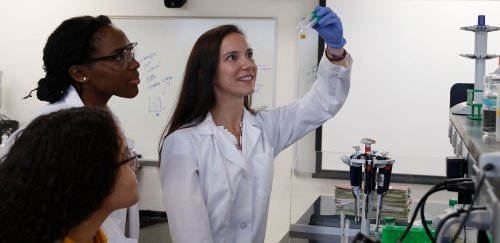Program Overview
The College Honors Program has three main parts:
I. General Education Honors Courses
All Rhode Island College students are required to complete the General Education Program, a sequence of courses in writing, literature, history, the social and behavioral sciences, the natural sciences, mathematics, and the arts. Most general education courses are taken during the first two years.
Students in the General Education Honors Program must take at least five of their required General Education courses in specially designed honors classes, including the “core” First Year Writing, First Year Seminar, and Connections Courses. Other Honors courses will be selected from the Area Distribution courses. It is highly recommended for freshman (required for honors scholarship recipients) to also register for the Honors 150* course, “The Honors Experience.” To emphasize active class participation and close student-teacher interaction, the Honors classes are kept small, usually twelve to fifteen students, and are conducted in a discussion rather than a lecture format. Honors sections often employ innovative teaching techniques.
In addition to completing at least five Honors General Education* courses, students must maintain an overall grade point average of 3.0 (reviewed every semester) in order to graduate with General Education Honors. Failure to maintain a 3.0 GPA may result in immediate loss of honors scholarship.
II. Junior Year Honors Colloquium Course
The Junior Year Honors Colloquium (Honors 351*) helps to prepare students to undertake departmental honors projects. It is a two-credit class, is graded credit/no credit, and may be taken twice. The class is open to continuing and transfer students who have achieved a 3.0 GPA. It is also open both to students who have and to those who have not participated in General Education Honors.
III. Senior Project (Departmental Honors Project)
Departmental Honors programs offer students the opportunity to do an independent research, critical, or creative project on a topic of the student's choice and directed by a professor of the student's choice. These projects are normally done in the senior year, although they may be begun earlier, and normally carry at least 6 credits of independent study over two semesters.
Honors students have conducted laboratory experiments. They have written critical and research papers in literature and the social sciences. They have composed and performed musical works, and produced videos, and they have researched and devised pedagogy for elementary and secondary education.
*Honors 150 and Honors 351 do not count toward the five general education honors classes.


